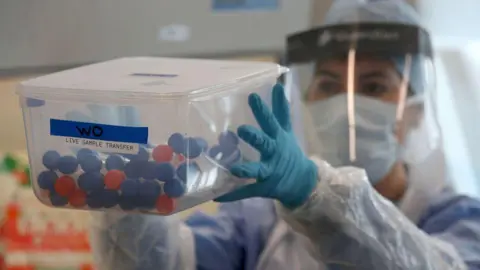 Getty Images
Getty ImagesThe government ignored an early warning by two Nobel prize-winning scientists that all healthcare workers should be routinely tested for coronavirus in the pandemic, the Covid inquiry has heard.
The advice came in a strongly-worded letter sent in April 2020 by the chief executive of the Francis Crick Institute, Sir Paul Nurse, and its research director, Sir Peter Ratcliffe, to the then health secretary Matt Hancock.
NHS and care home staff were not offered Covid tests until November 2020 in England, unless they had symptoms of the disease.
Matt Hancock is due to appear at the inquiry next week, along with other health ministers from the four nations of the UK.
Giving evidence, Sir Paul, who won the Nobel prize for medicine in 2001, said it was “disturbing” that he did not receive a response to his concerns until July 2020.
“For the secretary of state to ignore a letter from two Nobel laureates in physiology or medicine for three months is a little surprising, I would say,” he told the inquiry.
“Rather than acknowledge they couldn’t do it, because that would have indicated a mistake in their overall strategy, they remained silent.”
It was likely that the decision not to routinely test NHS and care home staff led to an increase in infections and deaths in the early stages of the pandemic, he added.
Hospitals and care homes
In the first six months of Covid, there was a frantic drive to increase testing for the disease. Matt Hancock set a target of 100,000 tests a day by the end of April 2020 in England.
By this time it had become clear to scientists across the world that Covid could be spread by people who had not developed symptoms, such as a cough or fever.
Sir Paul Nurse, Sir Peter Ratcliffe and their colleague Dr Sam Barrell wrote to Mr Hancock on 14 April 2020 saying they had “grave concerns” about “asymptomatic transmission” between healthcare staff and patients.
“We advise you that all NHS trusts and healthcare providers should be required to set up surveillance systems for the regular testing of all healthcare workers and patients with immediate effect,” the letter said.
The scientists received a response on 6 July 2020, signed by a junior official in the Department of Health.
That reply did not directly address the subject of healthcare workers, instead stating that testing was a “key part” of the government’s strategy and that capacity was being “rapidly expanded”.
Lighthouse labs
The Frances Crick Institute, headquartered in north London, is one of the largest biomedical research centres in the world.
As Covid hit, a team of 300 volunteers started using the organisation’s laboratory space and equipment to process Covid tests for dozens of hospitals, GP surgeries and care homes in the local area.
It had the capacity to carry out 4,000 tests a day and to increase that to 10,000 with more funding, according to Prof Nurse.
In March 2020, he wrote to the government offering to help with the national testing effort.
Instead ministers decided to set up a network of giant privately-run Lighthouse laboratories.
In his evidence, Prof Nurse accepted that the larger sites were needed, but said “insufficient attention” was paid to universities and other publicly-funded institutions, which could have quickly processed tests for healthcare workers, particularly in the early stages of the pandemic.
The sixth part of the Covid inquiry, which looks at the performance of test, trace and quarantine systems across the UK, runs until the end of May.


